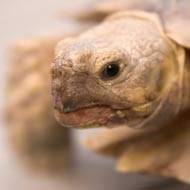Injured tortoise receives 3D printed shell

Four vets, a dental surgeon and a 3D designer used a desktop 3D printer, measurements and images of healthy tortoises. (Stock photo)
A tortoise has been given a second chance with a 3D printed prosthetic shell. The female, who was discovered severely injured by a fire, had the shell fitted by a team of designers in Brazil in a world first.
The Animal Avengers, a volunteer rescue group of four veterinary surgeons, a dental surgeon and a 3D designer used a desk top 3D printer, measurements and images of healthy tortoises to construct a four-piece life-saving prosthetic.
“Freddy was the first tortoise in the world to receive a fully rebuilt hull and the first creature that we, as a newly formed group of animal rescuers, decided to help,” said the designer Cicero Moraes. The designs were then sent to dental surgeon, Dr Paulo Miamoto who created the 3D print out.
Freddy, named after the fire-damaged film character Freddy Krueger, has returned to full mobility after the fire destroyed over 85 per cent of her hull. Her prosthetic shell was hand painted to enable her to blend into her natural habitat. She has since gone on to live in the care of vet, Dr Rodrigo Rabello.
The group have used the same specialist technology and medical expertise to create artificial beaks for toucans, a parrot and a goose.



 The RCVS has announced a new version of its 1CPD mobile app, with enhanced features for veterinary surgeons and veterinary nurses to record their continuing professional development.
The RCVS has announced a new version of its 1CPD mobile app, with enhanced features for veterinary surgeons and veterinary nurses to record their continuing professional development.